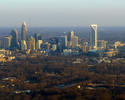The US Census Bureau has just released its July 1, 2020 population estimates for the approximately 19,500 incorporated municipalities (principally called cities, towns, villages). This article provides information on the 50 largest municipalities in the nation (Table below). read more »
Urban Issues
$85 Billion for Empty Buses and Railcars
The future of public transit is nearly empty buses and railcars. Yet President Biden’s American Jobs Plan calls for spending $85 billion on transit. Although transit carries less than 1 percent of passenger travel in the United States, and no freight, this represents 28 percent of the funds Biden proposes to spend on transportation. read more »
- Login to post comments
Combined Statistical Areas Lead Continuing Dispersion: 2010-2020
A commenter asked about population trends in combined statistical areas (CSA) in response to my article “Demographic Implosion in the San Francisco Bay Area?, posted on May 18. This article deals with CSA population trends in the 88 CSAs with more than 500,000 population. read more »
- Login to post comments
Demographic Implosion in the San Francisco Bay Area?
As the San Francisco Bay Area (combined statistical area, or CSA, as defined by the Office of Management and Budget) has sprawled into the San Joaquin Valley, all population growth has been in the three Valley metros for two years (Map above). This article describes population trends over the last 10 years in the CSA, which includes the six tidewater (adjacent to the ocean or the Bay) metropolitan areas, traditionally thought of as the Bay Area, including core San Francisco and San Jose as well as Santa Rosa, Napa, Vallejo and Santa Cruz. read more »
The Rust Belt Aesthetic
Overseas competition. Automation replacing industrial labor. The inability to adapt to the global economy. Unions. Even the weather. Many reasons are given for why Rust Belt cities have lagged the rest of the nation in their recovery from their industrial heyday. But there’s one under-recognized but still consequential reason – the poor quality of the Rust Belt aesthetic. Rust Belt cities have never quite been known for their looks, and in an era when looks increasingly matter, they often fall short. read more »
- Login to post comments
How Los Angeles Descended Into Neo-Feudalism and How to Fix It
For most of the last century, Los Angeles loomed as the next great American city, a burgeoning paradise riding the shift of world power west. It seemed posed to leave New York and London in the dust, the engines of growth inexorable. There was the city's dominance of the entertainment and aerospace industries, which incited migration from both the rest of the country and abroad, and all this promise was symbolized by a spread of suburban single-family houses that seemed to embody the ideal American dreamscape. read more »
- Login to post comments
Even the Manhattan Institute Says Curb Your Car
If an early April panel discussion (virtual) of the Manhattan Institute on “Planning the Post-Covid City” was surprisingly progressive, maybe it was because this talk of revolution in the streets was about reallocating little more than parking spaces. Yet that much upheaval is basic, these panelists agreed, to renewal of New York’s pre-pandemic glory. read more »
March 2021 Transit Ridership Down 59%
Public transit carried 33 percent fewer riders in March 2021 than in March 2020 and 59 percent fewer than in March 2019, according to data published yesterday by the Federal Transit Administration. read more »
The Geography of COVID-19
The ongoing pandemic is reshaping the geography of our planet, helping some areas and hurting others. In the West, the clear winners have been the sprawling suburbs and exurbs, while dense cores have been dealt a powerful blow. The pandemic also has accelerated class differences and inequality, with poor and working class people around the world paying the dearest price. These conclusions are based on data we have repeatedly updated. read more »
America’s Post-Pandemic Geography
Even as vaccination increases across the United States and an end to the tragedy of the Covid-19 pandemic seems in sight, the economic, fiscal, political, and geographic fallout from the virus cannot be overstated: a massive public health crisis that left more than half a million Americans dead, an economic catastrophe that caused record unemployment and small-business closures, and a seismic political event that surely helped tip the presidential election. The pandemic will pass, and the economy will revive, as it is already doing. read more »
- Login to post comments






















